Is The New Quora Advertisement Platform Worth Using?
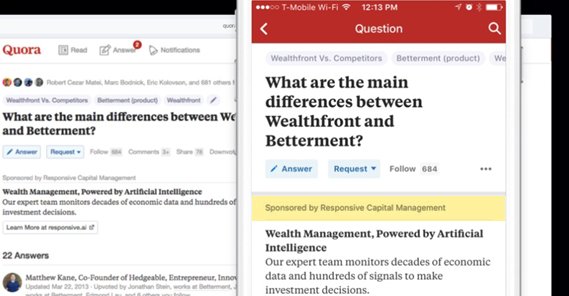
Quora is such a bizarre platform. Originally created to occupy the same space as contemporaries like Yahoo Answers but classier, the site spent years running on investment capital with no source of monetization to be found. It was heavily adopted by marketers and similar folks, anyone who could benefit from being known as a thought leader.
About the middle of 2017, they finally rolled out an ads platform, as most of us expected they would. With a new monetization stream, I’d venture to guess that the valuation of the company skyrocketed. Indeed, in 2014 or so the site was valued at around 900 million, while it’s now floating around 1.8 billion.
Not everyone agrees that Quora is here to stay, though. Some lump the Q&A site in with such big names as Orkut, Google+, or Myspace.
Personally, from a marketing standpoint, I don’t really care if the site lasts forever or if it keels over next year. So long as I can get some value out of it in the here and now, I believe it’s worthwhile. Enter the ads program.
By running ads on Quora, you can drive traffic to your landing pages and pull in value from the Q&A site above and beyond what you get from answering questions organically. The question is, how does it work, how much does it cost, and is it worth using?
Quora Ads Versus Other Ads
Quora is a question and answer site with a bit of a reputation for high profile thought leaders – and many people who want to be seen as thought leaders – answering questions. This doesn’t always mean the answers are accurate, of course. Plenty of marketers use the site as a way to pitch their products rather than objectively answer questions. Some are a lot more transparent than others.
At the core, Quora is used for information. In this sense, it’s perched in the same space as Reddit, Wikipedia, and just plain old Google search results with their infoboxes and their information ranking. You can’t run ads on Wikipedia, so the comparison there ends for us.
When you advertise on Google, you’re capturing intent from users by virtue of keyword choice. If you’re good at choosing the right keywords, you’ll rake in the views, but only so long as you have enticing copy. If the user doesn’t like any of the search results, they’re going to draw back and re-tailor their query, and your ad impression went for naught.
With Quora, you already have an audience interested in whatever topic is at hand. You know they’re looking for information, because they’re already on the Q&A site. There’s more intent and more basic assumptions that can be made to help refine your advertising. Plus, Quora ads display between answers and, while they’re somewhat ignorable, they aren’t such a disruption that it drives users away. That alone is somewhat unique these days.
The most powerful aspect of Quora ads is the ability to target yourself. Target your own product, your own niche, your own company name as keywords. Your ads will be positioned between the answers for any questions involving those keywords. You can seek out those questions – or even ask them yourself – and contribute answers as well. You’re basically capable of turning a Quora string into a fairly customized landing page for your brand.
How to Use Quora Ads
How does the whole Quora ad process work? To start, you need a Quora account. If you’ve followed some of my past content, you’ve likely already created an account for organic use, and you can just use that. For the purposes of Quora ads, you should use an account with your company information, rather than a sock puppet you use for creating answers without looking biased.
Now, before you even think about running ads, you need to lay the foundation for tracking their results. As you might expect from using Facebook for advertising, this involves installing tracking code on your site. The Quora Pixel is their version of the tracking pixel that traces its roots all the way back to email tracking.
In your Quora Ads dashboard, one of the top navigation links is the Quora Pixel. Click it and set up the pixel by clicking the gray button in the far right. Fill out the information it asks for and copy the code it gives you. You’ll want to put this code in the head section of your site, just as you would the Facebook pixel or Google Analytics tracking code. It’s easy enough to do, but if you’re not sure of what you’re doing, send it over to your developer to handle.
Quora has a similar ad structure to Facebook: you have Ad Campaigns, Ad Sets, and Ads. Think of it like ice in a fridge, the old style, not those fancy automatic ice makers kids these days get to play with. Your ad campaign is your freezer. Each ad set is an ice tray, and each ice cube is an individual ad. Ads are within sets, which are all within a campaign. The only place this metaphor breaks down is when you’re running multiple campaigns; not many people have multiple freezers these days.
Click to create a campaign and you’re brought to a fairly standard ad creation window, though it doesn’t have a ton in the way of extra documentation. You have two objective options: conversions or app installs. Choose the most relevant, which 9 times out of 10 will be conversions. Choose a daily maximum budget as per your willingness to spend money, and set a lifetime maximum if you want to make sure your campaign doesn’t over-spend. Be aware that your daily budget is a $5 minimum. Finally, choose whether the ads start immediately or you want them to start on a specific date – and end on a specific date if you want.
Once you have all of this set up, click continue to move to the ad set level. Come up with a name for your campaign, something descriptive enough to remember; this is internal information so don’t worry about it being public. Here you can choose a type of targeting to use.
- Topic targeting is typical keyword targeting. Use keywords, both positive and negative, to refine the sorts of questions and answers your ads will show up on.
- Audience targeting is more like Facebook ads, where you choose audience demographics to show your ads to regardless of the content they’re reading. Once you’ve run ads for a while with the Quora pixel installed, you can access audience retargeting here as well.
Topic targeting is easier to refine in terms of ad copy and relevance. The best use of Quora ads is to run ads on topics that are close to your intent, so your ads look more like an intended part of the answer string.
Once you dump in a list of keywords, Quora will give you a list of suggested topics based on the content they have available for advertising. Scan through this list and un-check any of the topics that don’t match your intent. For example, if you plug in a bunch of Facebook Marketing keywords, the suggested topics list will include a bunch of advertising and marketing strings. Find any that don’t fit your goal of Facebook marketing, and remove them from the list. You can then further refine your targeting with excluded locations and excluded topics, as negative keywords.
Now on to your ad copy. You have four components to a Quora ad you can specify, and they’re quite similar to Google ads, since they’re entirely text.
- Business name. This will show as a “promoted by business name” and gives you 30 characters of space.
- Headline sentence. This is like your ad title and shows up in bold at the top of your ad, with 65 characters of space.
- Body text. This is the non-bold main body copy for your ad. You have 105 characters of space here.
- Display URL. This is another 30 characters that shows the URL a user lands on, along with a brief call to action you choose from a list.
Use this space to good effect. All of the typical advice for text-based advertising apply here, so any tips for any other text ads can apply. Once you have that all filled out, you can run the ad immediately.
Do Quora Ads Work?
Quora ads certainly work. Let’s look at some data, shall we?
This post on Medium has a review of different aspects of Quora ads, giving them all middle of the road ratings. This is similar to my impression of them; it’s a basic ad system without a lot of the bells and whistles you might be accustomed to using Facebook ads, or even modern Google ads. They work, but they aren’t slick or deeply customizable.
That post, and this one from WordStream, both share another gripe with Quora ads, which is their expense. They tend to be 15% to 25% more expensive than comparable Google Ads. Google ads can be fairly cheap, though, and a more accurate comparison might be to third party blog ads or ad networks like Taboola or Outbrain. In those cases, Quora comes in somewhat cheaper.
This case study from the Quora Ads beta indicates one of the biggest problems with Quora, which is intent. Quora is primarily an informational platform. The people who end up on Quora from a Google search or from some other source are there because they want to learn or read information about a subject. It’s the same reason they might end up on Wikipedia.
The problem here is that the intent is to learn, not to buy. You have a harder time converting that intent into sales. The best ads on Quora tend to be ads that provide more information. A detailed landing page about a subject with a mailing list opt-in for more, a page that convinces the reader to opt-in to download or buy an informational e-book, and so on. Ads that try to push a product or service aren’t going to do quite so well.
This means Quora tends to work best as a top-of-funnel way to get new users into your sphere of influence, rather than a way to drag them further down into your sales funnel. Then again, that’s what remarketing is for. Once those users have visited your site, make new ads with audience targeting to remarket to those users and pull them ever deeper.
Effectively Using Quora Ads
First of all, check out this article. It’s full of examples of Quora ads in action, and can give you an idea of what a good ad is and what a not-so-good ad looks like.
After that, put all of your typical PPC ad knowledge to use. Your keyword research for Google ads transfers quite well over to Quora, so that’s a good place to start.
Keep an eye out for common mistakes.
- Make sure to follow the ad guidelines for capitalization and sentence formatting. Quora wants their ads to look native, so they require sentence case capitalization and will automatically reject ads that use camel casing or other odd formatting.
- Don’t run ads that are too broad. You’ll end up with a scattershot approach that doesn’t give you much useful data. Err on the side of narrow ads and expand from there once you see what works.
- Be aggressive in culling topics that are outside of your focus. It’s better to have a smaller selection of more relevant ads than a broad selection of irrelevant questions.
- Bid appropriately. Quora suggests a bid based on your targeting and it’s usually a good idea to aim for somewhere in the middle of their range. Don’t set a low bid cap lest you end up under-bidding and not winning the auctions.
And of course, my common piece of advice: start small and work your way up. Unless you have money to burn, it’s always better to start with a few small tests to see how the waters feel.

 ContentPowered.com
ContentPowered.com
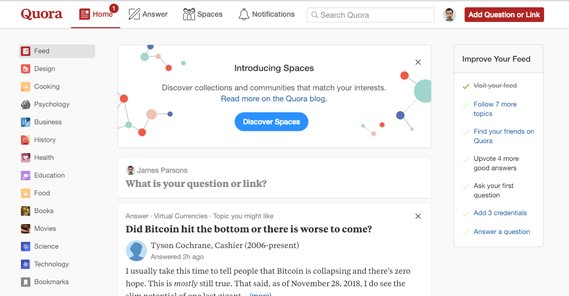
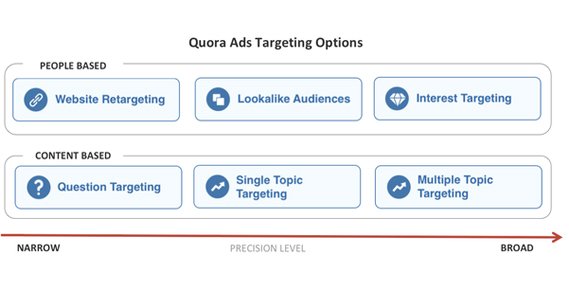
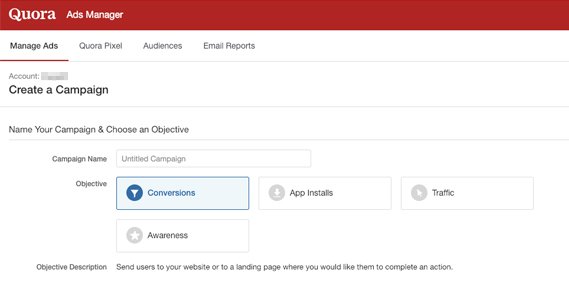

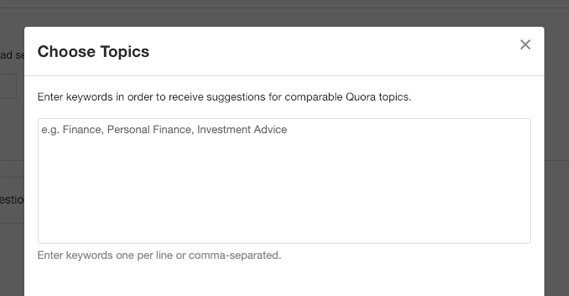
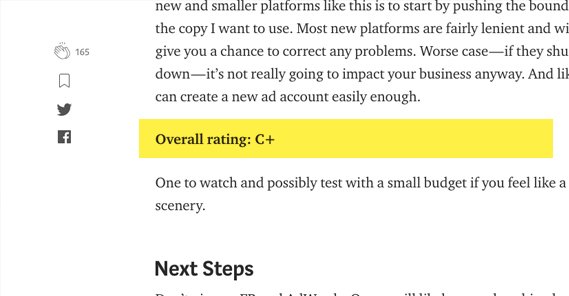
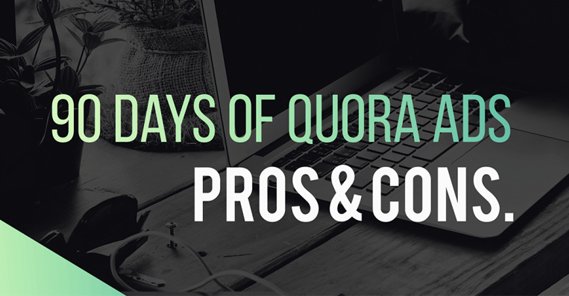



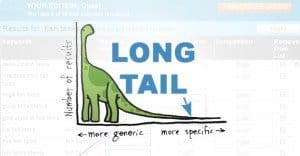
Sophia Martinez
says:Great article James! Seems like we both agree on Quora Ads are quite expensive comparing to Google Ads! I ran two campaigns one for dental service and for app installs. App install seemed to work pretty well.